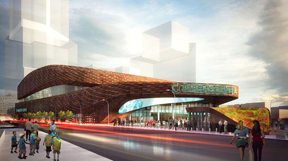On July 13, New York State Supreme Court Justice Marcy Friedman ruled that the Empire State Development Corporation (ESDC) acted illegally in 2009 when it approved changes to the Atlantic Yards project that increased the amount of time allowed to developer Forest City Ratner Companies (FCRC) to complete the project — from 10 years to 25 — without first studying the impacts of prolonged construction to the surrounding communities.
 In her decision, the judge lambasted ESDC for its “continuing use of the 10-year build date [that] was not merely inaccurate; it lacked a rational basis given the major change in deadlines reflected in the MTA and Development Agreements.”
In her decision, the judge lambasted ESDC for its “continuing use of the 10-year build date [that] was not merely inaccurate; it lacked a rational basis given the major change in deadlines reflected in the MTA and Development Agreements.”
After concluding that the 10-year build date lacked a rational basis, Friedman went on to address ESDC’s poor attempt to fill the void with a quickly put together technical analysis: “Notably, the Technical Analysis is silent as to the impacts on neighborhood character and socioeconomic conditions of vacant lots, above ground arena parking and constructing staging, which may persist not merely for a decade, but, as petitioners aptly put it, for a generation.”
The judge has ordered the ESDC to prepare a supplemental environmental impact statement (SEIS), hold a public hearing on the SEIS, and reconsider the 2009 modified general project plan in light of the new SEIS.
The lawsuit was filed in November 2009 by BrooklynSpeaks, an initiative of civic associations, community-based organizations, and advocacy groups concerned about the future of development at the Atlantic Yards site. (The Park Slope Civic Council is one of the coalition’s sponsors.) The case was originally decided in favor of ESDC and FCRC in March 2010, on the basis of representations made by ESDC as to the terms of its master development agreement with FCRC prior to the agreement being made available to the public. After the agreement was released and was found to contain no performance guarantees for a 10-year build out, the BrooklynSpeaks sponsors successfully argued for the case to be reopened.
The BrooklynSpeaks groups were elated and called on Governor Cuomo to investigate the project. “This decision sends a clear message that no State authority or politically connected real estate developer can be above the law when the future of our neighborhoods hangs in the balance,” said Jo Anne Simon, Democratic leader of the 52nd District. “We expect an investigation into how this was allowed and call on Governor Cuomo to now take decisive action in reforming oversight of Atlantic Yards, ESDC’s largest project.”
Al Butzel of the Urban Environmental Law Center, which represented the BrooklynSpeaks sponsors, said: “After reviewing ESDC’s justification for not preparing a supplemental environmental impact statement, the Court correctly concluded the agency lacked a rational basis for approving the developer’s proposed changes to the project. It was clear to us that the approval of the plan was rushed through illegally in order to enable FCRC to meet a deadline necessary for its arena bond financing.”
The BrooklynSpeaks sponsors had argued that decades of extended construction, including the use of large portions of the site for a 1,100-car surface parking lot, would have a blighting impact on the surrounding communities. “Two years after Atlantic Yards’ revised plan was adopted by ESDC, the project has yet to deliver any significant jobs for the people of Brooklyn, and its affordable housing is literally nowhere in sight,” said Michelle de la Uz, executive director of the Fifth Avenue Committee. “FCRC has moved forward with paving land where working families used to live. Now, there is an opportunity to make Atlantic Yards accountable to the public and ensure that the promised benefits of jobs for local residents, affordable housing and open space are delivered without further tax payer subsidy or delay.”
“Although this decision marks a major victory for the community, litigation against the ESDC and FCRC was never our first choice,” said Danae Oratowski, chair of the Prospect Heights Neighborhood Development Council. “With no local elected officials having a vote in the approval process, and faced with decades of construction blight, we were ultimately left no other options. We now look forward to reforms at ESDC that will allow us to move forward constructively.”

